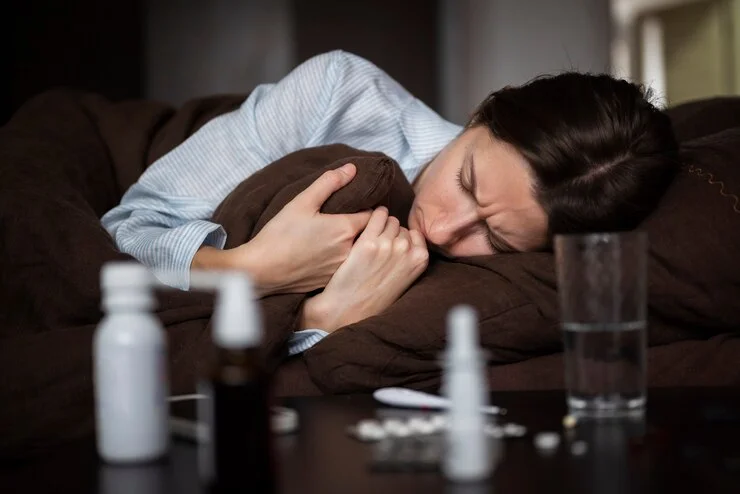Why does depression make you tired?
Depression is more than just a bad day or a fleeting feeling of sadness. It’s a pervasive mood disorder that affects millions of people around the world, significantly impacting their daily lives, work, and relationships. While most people associate depression with emotional symptoms like sadness, hopelessness, and a lack of interest in previously enjoyed activities, it also manifests through various physical symptoms. Among the most challenging physical symptoms is fatigue—a profound and persistent sense of tiredness that doesn’t improve with rest.
Understanding why depression can lead to such intense tiredness requires a dive into the complexities of the condition itself. This blog aims to explore the multifaceted reasons behind the exhaustion caused by depression, shedding light on biological, psychological, and lifestyle factors. Our goal is to provide insights that can help those affected by depression understand and manage their fatigue, ultimately improving their quality of life.
Understanding Depression and Its Impact on Energy Levels

Definition and Symptoms of Depression
The American Psychiatric Association defines depression as a frequent and significant medical disorder that hurts how you feel, think, and behave. Symptoms must last at least two weeks and represent a change in your previous level of functioning to be considered depression. Beyond the well-known emotional symptoms, depression often leads to physical complaints, with fatigue being one of the most prevalent.
The Link Between Depression and Fatigue
The connection between depression and fatigue is well-documented but complex. Fatigue in depression is not just a matter of feeling “sleepy”; it’s a pervasive lack of energy that can significantly impair one’s ability to function. This type of fatigue can make even simple tasks feel insurmountable, contributing to the cycle of depression by exacerbating feelings of worthlessness and hopelessness.
Biological Factors Contributing to Fatigue in Depression

Several biological mechanisms underpin the fatigue experienced in depression:
- Chemical Imbalances: Neurotransmitters like serotonin, dopamine, and norepinephrine play crucial roles in mood regulation. Imbalances in these chemicals can contribute to both the emotional and physical symptoms of depression, including fatigue.
- Altered Circadian Rhythms: Many individuals with depression experience changes in their sleep-wake cycles, which can disrupt natural energy levels throughout the day.
- Inflammatory Responses: Emerging research suggests that inflammation may play a role in depression, potentially contributing to the fatigue experienced by sufferers.
Psychological and Emotional Factors
The mental exhaustion that comes from coping with depression also plays a significant role in fatigue. Persistent negative thoughts, feelings of guilt, and rumination require substantial mental energy, leaving less available for physical activities. This emotional toll can manifest as physical tiredness, further complicating the cycle of depression.
How Depression Affects Sleep and Leads to Tiredness

Impact of Depression on Sleep Patterns
One of the most significant ways depression influences energy levels is through its impact on sleep. People with depression often experience sleep disturbances, including insomnia (difficulty falling or staying asleep) and hypersomnia (excessive sleepiness). These disruptions are not just symptoms of depression but can also exacerbate its severity, creating a vicious cycle where poor sleep further depletes energy levels and worsens depressive symptoms.
Insomnia related to depression can lead to a chronic state of restlessness and fatigue, making it hard for individuals to feel refreshed even after a whole night’s sleep. On the other hand, hypersomnia can leave individuals feeling groggy and unfocused, similarly depleting their energy levels during waking hours.
The Role of REM Sleep and Its Impact on Energy Levels
Rapid Eye Movement (REM) sleep, the sleep stage associated with dreaming, is particularly affected by depression. Studies show that individuals with depression often enter REM sleep earlier in the night and spend a more extended portion of their sleep cycle in this stage. This alteration can disrupt the vital processes of sleep, leading to feelings of tiredness upon waking.
Improving sleep quality is thus a critical step in managing depression-induced tiredness. Strategies can include establishing a regular sleep schedule, creating a comfortable sleep environment, and possibly seeking medical advice for sleep aids or therapies specifically designed to address sleep disturbances associated with depression.
Lifestyle Factors and Depression-Induced Fatigue

Physical Inactivity and Its Impact on Energy Levels
Depression can significantly reduce motivation for physical activity, leading to a sedentary lifestyle that further contributes to fatigue. Exercise, however, plays a vital role in boosting energy levels and improving mood through the release of endorphins, often referred to as “feel-good” hormones. Encouraging regular, moderate exercise can help break the cycle of inactivity and fatigue, providing both immediate and long-term benefits for individuals with depression.
Diet and Nutrition: Their Role in Managing Depression and Fatigue
Nutrition also plays a crucial role in managing depression and associated fatigue. Deficiencies in vitamins and minerals, such as iron, vitamin D, and B vitamins, can exacerbate tiredness. A balanced diet of fruits, vegetables, lean proteins, and whole grains can support overall energy levels and mood.
Incorporating foods with omega-3 fatty acids, like salmon and flaxseeds, can also be beneficial. Omega-3s have been linked to improved mood and cognitive function, potentially helping to alleviate some symptoms of depression.
Coping Strategies and Treatments
Medical Treatments and Their Effectiveness
When it comes to treating depression and its symptoms, including fatigue, medication can be a vital component. Antidepressants can help correct chemical imbalances, potentially alleviating both emotional and physical symptoms of depression. However, it’s important to discuss potential side effects, including impacts on energy levels, with a healthcare provider.
Therapy, particularly cognitive-behavioral therapy (CBT), is another effective treatment for depression. CBT can help individuals develop coping strategies for dealing with negative thoughts and behaviors that contribute to fatigue.
Lifestyle Adjustments and Self-Care Measures
Alongside medical treatments, making lifestyle adjustments is crucial in managing depression-induced fatigue. Establishing a structured daily routine can help regulate sleep patterns and ensure consistent time for exercise and relaxation. Mindfulness and meditation may also offer benefits by reducing stress and improving sleep quality.
Conclusion
Depression is a complex condition that affects millions globally, manifesting not only in emotional distress but also in physical symptoms like fatigue. This tiredness isn’t simply about feeling sleepy; it’s a profound, pervasive lack of energy that can significantly hinder daily functioning and quality of life. Throughout this blog, we’ve delved into the multifaceted reasons behind this fatigue, including the biological, psychological, and lifestyle factors. We’ve seen how sleep disturbances and improper lifestyle choices can exacerbate this tiredness, creating a challenging cycle of symptoms that feed into one another.
Understanding the link between depression and fatigue is crucial, not just for those experiencing it firsthand but also for their loved ones and healthcare providers. Recognizing that this fatigue is a symptom of a deeper issue is the first step toward addressing it. From medical treatments like antidepressants and therapy to lifestyle adjustments involving diet, exercise, and sleep hygiene, there are numerous strategies to combat the exhaustion that comes with depression.
However, it’s important to remember that managing depression and its associated fatigue is often not something that can be done alone. Seeking expert help is an essential step in the right way. Mental health professionals can offer personalized advice and treatment plans that address both the mental and physical aspects of depression.
The importance of community and support cannot be emphasized. Whether it’s family, friends, or support groups, having a network of people who understand and support you can make a significant difference. These communities can offer emotional support, practical advice, and coping strategies that have worked for others.
Final Thoughts
Depression-induced tiredness is a real and challenging symptom, but with the right strategies and support, it can be managed. If you or someone you know is struggling with depression and fatigue, remember that help is available. With a combination of medical treatment, lifestyle changes, and support, it’s possible to regain energy and start enjoying life again.
In closing, let’s hold onto hope and take proactive steps toward healing. Depression may be a part of your story, but it doesn’t define your entire narrative. You’re moving forward with each small step, whether reaching out for help, taking a walk outside, or simply acknowledging your feelings. And in the journey toward healing, every step forward is worth celebrating.







